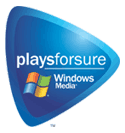Microsoft PlaysForSure

Microsoft PlaysForSure was a certification given by
PlaysForSure was introduced in 2004.[1] In 2007, Microsoft rebranded and scaled back "PlaysForSure"[2] [3] into the subset Certified for Windows Vista.[4]
Microsoft's
Microsoft announced that as of August 31, 2008, PlaysForSure content from their retired MSN Music store would need to be licensed to play before this date[when?] or burned permanently to CD,[6] although this decision was later reversed.[7] With the exception of Windows Media Player, all of the PlaysForSure offerings were made or run by 3rd-party companies, while Microsoft's Entertainment and Devices Division developed and marketed the Zune.
Overview
There exist many tests to obtain PlaysForSure certification. The most commonly referenced requirements include the ability to play files encoded in
Content providers that offered PlaysForSure-certified content
Only audio content were ever offered by PlaysForSure content providers; although Microsoft provides a PlaysForSure certification for video content, as well as a variety of PlaysForSure-certified portable and network video players that could play PlaysForSure-certified video, if it were offered, no online store offered video content that would be certified to play on all PlaysForSure video players.
- SoundsRightNow.com
- AOL MusicNow (closed)
- Yahoo! Music Unlimited (closed)
- Spiralfrog(closed)
- MTV URGE(closed)
- MSN Music (closed)
- Musicmatch Jukebox (closed)
- Wal-Mart Music Downloads (switched to MP3)
- Ruckus Network (closed)
- PassAlong Networks (closed)
- Rhapsody (switched to MP3)[8]
- Napster To Go
- iMesh (switched to MP3)
- BearShare (switched to MP3)
Hardware vendors that support PlaysForSure-certified media
Software that can stream media to PlaysForSure devices
- Windows Media Player versions 10 and 11
- SimpleCenter supports the media devices USB mass storage, and PlaysForSure certified devices".
Criticisms
A 2005 court case strongly criticised the wording of a Microsoft licensing agreement related to portable devices.[9] The license prohibited makers of portable devices compatible with Windows Media Player from using non-Microsoft audio encoding formats. Microsoft indicated that the wording of their license was poorly written due to an oversight by a junior Microsoft employee. Microsoft quickly amended their stringently worded license agreement at the judge's behest.
See also
- Digital Rights Management
- Media Transfer Protocol
References
- ^
Microsoft plans branding assault, CNET News
- ^ PlaysForSure Network Media Devices and Windows Vista (WinHEC 2007; 1.7 MB), Slide 13, Retrieved 2007-12-14 from Digital Media Devices and the Windows Logo Program: New Directions for PlaysForSure Testing.
- ^ PlaysForSure Portable Devices and Windows Vista (WinHEC 2007; 3.0 MB), Slide 32. Retrieved 2007-12-14 from Digital Media Devices and the Windows Logo Program: New Directions for PlaysForSure Testing.
- ^ PlaysForSure is growing up!. Retrieved 2007-12-14
- ^ "Technology | Zune problems for MSN customers". BBC News. 2006-11-06. Retrieved 2012-06-26.
- ^ Hutchinson, Lee (2008-04-22). "Microsoft to Discontinue PlaysForSure Support". Arstechnica.com. Retrieved 2012-06-26.
- ^ [1] Archived January 24, 2009, at the Wayback Machine
- ^ Hutchinson, Lee (2008-06-30). "Rhapsody's DRM-free music store offers little to excite". Ars Technica. Retrieved 2012-06-26.
- ^ Judge blasts MS bid to monopolize music devices, The Register, 27 Oct, 2005. Accessed 22 Aug 2006.
